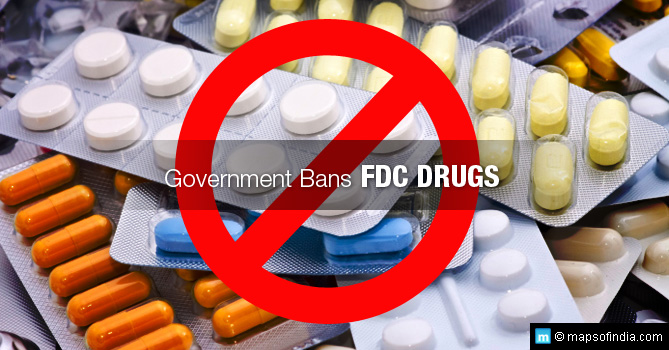On 10 March 2016, the Union Health Ministry banned 344 fixed drug combinations by issuing a gazette notification. The list is inclusive of a number of commonly used cough syrup solutions, as well as antibiotic combinations and analgesics. Majority of the combinations banned are sold over the counter. The government had recently constituted an expert committee in order to gauge how effective were the various drug combinations found in India. It was on the basis of the recommendations made by the said committee that the ban was imposed. However, it is expected that the industry will not take this lying down, in fact, some of the companies affected by the ruling may even seek judicial redress.
Nimesulide
Nimesulide is one of the drugs that have been banned. Health experts have been concerned for long about its continued usage in India in spite of the fact that in majority of the developed countries this medicine has been banned. Fixed drug combinations have been growing at an exponential rate these days in the Indian pharmaceutical market and there are several reasons for the same. First of all, companies are always on the lookout for fresher products and they want to escape the brunt of price control measures as well. This is the reason that companies these days are creating combinations of various ingredients and then marketing them as new medicines.
The Problem of Drug Resistance
A lot of these medicines, thus developed, happen to have antibiotics in their make. They are also sold in an over-the-counter manner, thus, making it hard for authorities to carry out drug resistance measures properly. Recently, the Health Ministry had started a programme to reduce the casual and irresponsible manner in which antibiotics are consumed in India. As a result of that initiative, the government has now come up with a special schedule that requires chemists to check prescriptions before they sell medicines and also have records of the same. If they don’t observe these measures, they may face actions initiated by the government against them.
Step Taken by Pfizer
Pfizer, one of the major pharmaceutical companies working in India, has already stopped making and selling Corex, a cough syrup that is fairly popular in the country, immediately after the directive was issued. Corex features a combination of Chlopheniramine Maleate and Codeine Syrup, a combination that has been banned by the Indian government. The company has, however, said that the safety and efficacy profiles of its products in India are fairly well established. In the given circumstances, it is also looking at all the options available to itself. The company has also said that this government order can have a bad impact on the revenue it earns and the profits it makes. In the nine months leading up to 31 December 2015 Corex had generated sales of INR 176 crore, easily making it one of the main money-spinners for Pfizer. Already, the shares of Pfizer have taken some hit owing to the stoppage in manufacture and sale of Corex.
Combinations Banned
Following is a brief list of combinations banned by the union government:
- Aceclofenac, Paracetamol, and Rabeprazole
- Diclofenac, Tramadol, and Chlorzoxazone
- Nimesulide and Diclofenac
- Dicyclomine, Paracetamol and Domperidone
- Nimesulide, Cetirizine, and Caffeine
- Nimesulide and Paracetamol dispersible tablets
- Nimesulide and Tizanidine
- Paracetamol, Phenylephrine, and Caffeine
- Paracetamol, Cetirizine, and Caffeine
- Diclofenac, Tramadol, and Paracetamol
Delhi High Court extends stay on ban of some drugs till 28 March
The Delhi High Court put on hold a ban that has been imposed on the sale and manufacture of more than 300 fixed dose combinations (FDC) medicines like D’Cold, Vicks Action 500 Extra and Benadryl. After resuming a hearing on pleas by 30+ pharmaceutical companies, the court decided to hold the ban till 28 March 2016. Previously, Delhi High Court had offered an interim relief on 14 March to Pfizer’s cough syrup ‘Corex’.
Explore More :
Drug Abuse: Causes and Solutions
Central Drugs Standard Control Organization Of India : The Reality
Generic Drugs in India: More Awareness Required
US Ban on Indian Drugs Hits Pharmaceutical Industry
Jan Aushadhi Yojana Online Medical Consultation: Will It Be a Success in India?





